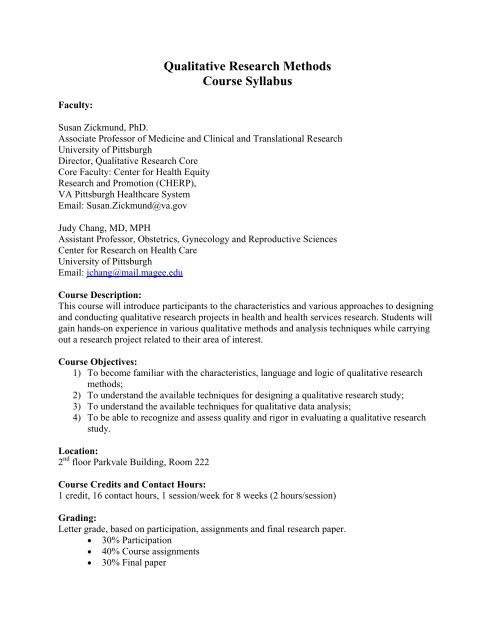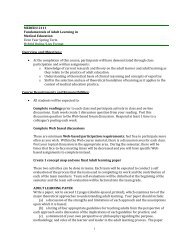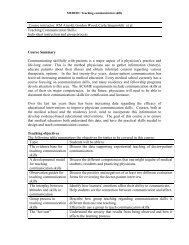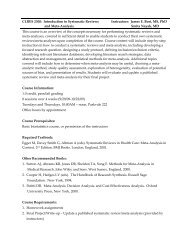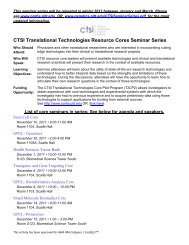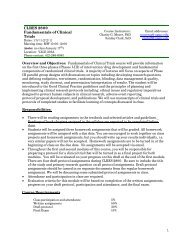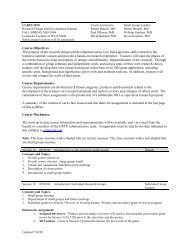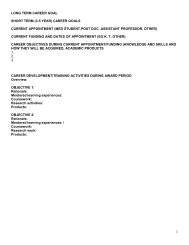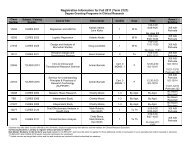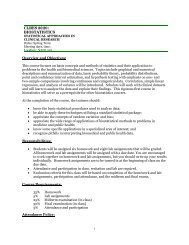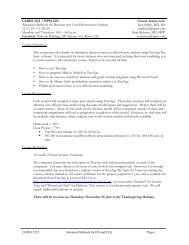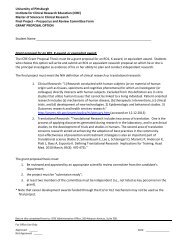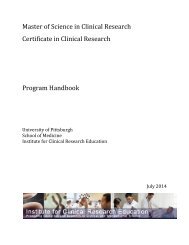Qualitative Research Methods Course Syllabus - University of ...
Qualitative Research Methods Course Syllabus - University of ...
Qualitative Research Methods Course Syllabus - University of ...
You also want an ePaper? Increase the reach of your titles
YUMPU automatically turns print PDFs into web optimized ePapers that Google loves.
<strong>Qualitative</strong> <strong>Research</strong> <strong>Methods</strong><br />
<strong>Course</strong> <strong>Syllabus</strong><br />
Faculty:<br />
Susan Zickmund, PhD.<br />
Associate Pr<strong>of</strong>essor <strong>of</strong> Medicine and Clinical and Translational <strong>Research</strong><br />
<strong>University</strong> <strong>of</strong> Pittsburgh<br />
Director, <strong>Qualitative</strong> <strong>Research</strong> Core<br />
Core Faculty: Center for Health Equity<br />
<strong>Research</strong> and Promotion (CHERP),<br />
VA Pittsburgh Healthcare System<br />
Email: Susan.Zickmund@va.gov<br />
Judy Chang, MD, MPH<br />
Assistant Pr<strong>of</strong>essor, Obstetrics, Gynecology and Reproductive Sciences<br />
Center for <strong>Research</strong> on Health Care<br />
<strong>University</strong> <strong>of</strong> Pittsburgh<br />
Email: jchang@mail.magee.edu<br />
<strong>Course</strong> Description:<br />
This course will introduce participants to the characteristics and various approaches to designing<br />
and conducting qualitative research projects in health and health services research. Students will<br />
gain hands-on experience in various qualitative methods and analysis techniques while carrying<br />
out a research project related to their area <strong>of</strong> interest.<br />
<strong>Course</strong> Objectives:<br />
1) To become familiar with the characteristics, language and logic <strong>of</strong> qualitative research<br />
methods;<br />
2) To understand the available techniques for designing a qualitative research study;<br />
3) To understand the available techniques for qualitative data analysis;<br />
4) To be able to recognize and assess quality and rigor in evaluating a qualitative research<br />
study.<br />
Location:<br />
2 nd floor Parkvale Building, Room 222<br />
<strong>Course</strong> Credits and Contact Hours:<br />
1 credit, 16 contact hours, 1 session/week for 8 weeks (2 hours/session)<br />
Grading:<br />
Letter grade, based on participation, assignments and final research paper.<br />
• 30% Participation<br />
• 40% <strong>Course</strong> assignments<br />
• 30% Final paper
Overview <strong>of</strong> Sessions<br />
Session 1 (1/11/11): Overview <strong>of</strong> <strong>Course</strong><br />
• Understanding the characteristics, language and contributions <strong>of</strong> qualitative research to<br />
health and health services research.<br />
• Distinctions between qualitative and quantitative research approaches and methods.<br />
• Session overview, assignments, expectations, etc.<br />
• Student introductions and research interests<br />
Session 2 (1/18/11): Study Design and Interview Data Collection<br />
• Designing research questions<br />
• Sampling<br />
• IRB issues<br />
• Designing an interview guide and interview questions<br />
• Interviewing<br />
• Brief overview <strong>of</strong> field observation and other methods<br />
Session 3 (1/25/11): <strong>Qualitative</strong> Data Collection Theory and Codebook Development<br />
• <strong>Qualitative</strong> schools <strong>of</strong> thought<br />
• Initial thoughts on qualitative analysis<br />
• ABCs <strong>of</strong> Codebook development<br />
Session 4 (2/1/11): Writing About <strong>Qualitative</strong> <strong>Research</strong><br />
• Publishing qualitative research (Guest Lecturer: Bob Arnold)<br />
• Writing up the qualitative data collection methods<br />
Session 5 2/8/11: Focus Group Data Collection<br />
• Focus groups (Guest Lecturer: Martha Terry)<br />
Session 6 (2/15/11): <strong>Qualitative</strong> Data Analysis<br />
• Coding<br />
• Building analysis/theory<br />
• Working with teams<br />
• Intercoder reliability<br />
Session 7 (2/22/11): Mixed <strong>Methods</strong> and <strong>Qualitative</strong> s<strong>of</strong>tware<br />
• Combining qualitative and quantitative methods<br />
• S<strong>of</strong>tware tools, data tracking and management<br />
• Writing up the thematic analysis section <strong>of</strong> an article<br />
Session 8 (3/1/11): Intercoder Reliability, <strong>Qualitative</strong> Check-List, <strong>Course</strong> Wrap up<br />
• Calculating intercoder reliability<br />
• Discussion <strong>of</strong> final papers<br />
• Overview and assessment <strong>of</strong> course<br />
2
<strong>Course</strong> Readings<br />
Readings: The course readings will come primarily from the <strong>Course</strong> Packet and <strong>Qualitative</strong><br />
<strong>Research</strong> and Evaluation <strong>Methods</strong> by Michael Quinn Patton (pub 2002 by Sage Publications).<br />
Readings described as “required” are those that we feel provide important general<br />
insight/information regarding particular qualitative research topics. These are readings from<br />
which we intend to build our course lectures and discussions. Readings described as “suggested”<br />
are those we felt would further enhance your knowledge and understanding <strong>of</strong> specific topics<br />
with further detail and description. Through the next 8 weeks <strong>of</strong> this course, we may also bring<br />
in additional articles, chapters or articles that we find would be helpful and relevant to your<br />
learning.<br />
For each session, students are expected to come with the following reading assignments<br />
completed:<br />
Session 1:<br />
1) Giacomini MK, Cook DJ. 2000. User’s guide to the medical literature: XXIII.<br />
<strong>Qualitative</strong> research in health care B. What are the results and how do they help me<br />
care for my patients JAMA 284(4): 478-482<br />
Session 2:<br />
1) Kvale S. 1996. “Thematizing and Designing an Interview Study” in InterViews: An<br />
Introduction to <strong>Qualitative</strong> <strong>Research</strong> Interviewing. Thousand Oaks, CA: Sage<br />
Publications, 83-108.<br />
Session 3:<br />
1) Patton, pp. 440 – 442 (Organizing the Data and Protecting the Data) and Patton 452-<br />
471 (start with section entitled “Pattern, Theme, and Content Analysis”)<br />
2) (Suggested but not required): Strauss A and Corbin J. 2000. Grounded theory<br />
methodology: an overview. In Handbook <strong>of</strong> qualitative research. NK Denzin and YS<br />
Lincoln (eds.). Thousand Oaks, CA: Sage Publications.<br />
Session 4:<br />
1) Patton MQ. 1999. Enhancing the quality and credibility <strong>of</strong> qualitative analysis. Health<br />
Services <strong>Research</strong> 34:1189-1208.<br />
2) (Suggested but not required): Mays, N and Pope C. 2000. Assessing quality in<br />
qualitative research. British Medical Journal 320(7227): 50-52.<br />
Session 5:<br />
1) Stewart DW, Shamdasani PN. 1990. “Chapter 1: Introduction” in Focus Groups:<br />
Theory and Practice. Newbury Park, CA: Sage Publications, 9-32.<br />
2) Stewart DW, Shamdasani PN. 1990. “Chapter 6: Analyzing Focus Group Data” in<br />
Focus Groups: Theory and Practice. Newbury Park, CA: Sage Publications, 102-121.<br />
3
Session 6:<br />
1) Pope C. 2000. <strong>Qualitative</strong> research in health care: analyzing qualitative data. British<br />
Medical Journal 320(7227): 114-116.<br />
2) Sandelowski M. 1998. Writing A Good Read: Strategies for Re-Presenting <strong>Qualitative</strong><br />
Data. <strong>Research</strong> in Nursing & Health 21: 375-382.<br />
Session 7:<br />
1) Morgan DL. 1998. Practical Strategies for Combining <strong>Qualitative</strong> and Quantitative<br />
<strong>Methods</strong>: Applications to Health <strong>Research</strong>. <strong>Qualitative</strong> Health <strong>Research</strong> 8(3): 362-378.<br />
2) (Suggested but not required): Devers KJ. 1999. How will we know “good” qualitative<br />
research when we see it Beginning the dialogue in health services research. Health<br />
Services <strong>Research</strong> 34(5): 1153-1188.<br />
Session 8:<br />
1) Giacomini MK, Cook DJ. 2000. Users’ Guides to the medical literature: XXII.<br />
<strong>Qualitative</strong> research in healthcare, are the results <strong>of</strong> the study valid JAMA 284:357-62.<br />
2) Rowan M, Huston P. 1997. <strong>Qualitative</strong> <strong>Research</strong> Articles: Information for Authors and<br />
Peer Reviewers. Canadian Medical Association Journal 157: 1442-6.<br />
4
<strong>Course</strong> Assignments<br />
Assignments: We feel that to best appreciate and understand qualitative methodology, one must<br />
experience some <strong>of</strong> the process—with its various rewards and challenges—first hand. These<br />
assignments will serve as the focus <strong>of</strong> discussion for many <strong>of</strong> the sessions and, thus, are<br />
considered mandatory for full participation in this course. For each session, students are expected<br />
to come with the following assignments completed:<br />
Session 2: Interview/Focus Group Script Assignment<br />
Based on class discussion and readings, create or revise interview or focus group questions.<br />
Submit for discussion.<br />
Session 4: Interview/Focus Group Assignment<br />
Identify and recruit 1 interview participant or choose 5 interviews or 2 focus groups from data<br />
you have already collected. If completing new data collection, conduct 1 audio-taped interview<br />
or focus group using your revised interview script. Listen to entire interview/focus group tape(s)<br />
or transcript(s), take notes on: interesting findings, ways to revise questions for future use,<br />
your/your assistants’ interviewing/focus group moderating skills – good and bad. Please type up<br />
a minimum <strong>of</strong> 1 paragraph. on what was interesting in the text you examined, what would be<br />
important to capture in codes, what qualitative methods you would use for your data<br />
collection/analysis. Also turn in a revised interview/focus group script.<br />
Session 5: Grant/Article language<br />
Turn in your first draft <strong>of</strong> the qualitative data collection methods. Be sure to include: Description<br />
<strong>of</strong> the sampling frame, qualitative data collection methods, any piloting <strong>of</strong> the script, training <strong>of</strong><br />
the interviewers/focus group staff, details <strong>of</strong> data collection (description <strong>of</strong> the focus group<br />
details, method/procedure for collecting interview data, etc.), method <strong>of</strong> capturing information<br />
(note taking, audio recording, etc.), whether transcripts are used or audio file and details specific<br />
to that process.<br />
Session 6: Coding Assignment, Part 1.<br />
You will either work with your own interviews or focus group scripts (or ones provided by the<br />
class). Read 5 interviews or 2 focus groups in conjunction with its script and the research<br />
questions. Do a close reading <strong>of</strong> the data with a focus on important emerging themes, keeping in<br />
mind key issues critical to answering the research questions. Develop a preliminary codebook.<br />
Use a fine-grained coding approach with the goal <strong>of</strong> capturing more themes than you expect to<br />
remain after the refinement process. Type up a list <strong>of</strong> the codes, provide initial definitions, and<br />
how many times they were encountered in the coding process.<br />
Session 7: Coding Assignment, Part 2<br />
Take the coding list developed above and add 5 more interviews or 2 more focus groups. Train<br />
your partner in your codebook to see codes the same way you do. Type up a list <strong>of</strong> these refined<br />
codes, provide refined definitions, and how many times they were encountered in the coding<br />
5
process. Note the frequency <strong>of</strong> agreement/disagreement per code. Add a 1 paragraph description<br />
<strong>of</strong> success and challenges in this codebook refinement process.<br />
Session 8: Analysis Assignment.<br />
Turn in your first draft <strong>of</strong> the qualitative analysis section for an article or grant. Be sure to<br />
include: qualitative methods used with a description <strong>of</strong> the overall approach, the codebook<br />
development process, the team or individuals who will be involved in coding and the process you<br />
will use for training, describe the codebook refinement process, intercoder reliability process,<br />
data management, and the approach to the final thematic analysis.<br />
Final Paper Assignment<br />
For the final assignment you should provide either a grant or an article methods/analysis section<br />
as described throughout the class. The goal is to use this opportunity to refine the prose <strong>of</strong> the<br />
sections that have already been created in order to walk away with a polished approach to<br />
qualitative data collection and analysis that you can use for grants and articles. The one segment<br />
that is included here that has not been previously assigned and workshopped is a thematic<br />
analysis. The methods and approach to this final paper will be spelled out as we go along, as will<br />
the final thematic analysis, which will be based on the class codebook refinement assignment.<br />
FINAL PAPER ASSIGNMENT DUE MARCH 7, 2011.Email an electronic version <strong>of</strong> the<br />
paper to BOTH Susan Zickmund and Judy Chang (Susan.Zickmund@va.gov and<br />
jchang@mail.magee.edu).<br />
6


